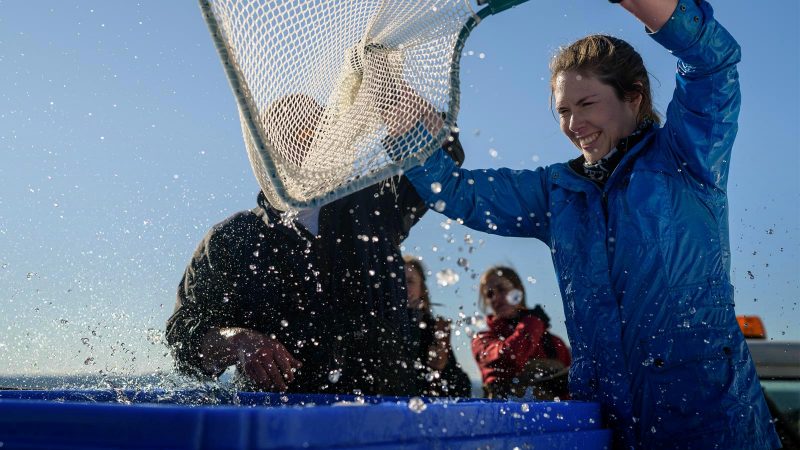Cooke makes a fish farming comeback in Washington waters
Northwest Aquaculture Alliance says Liberal political policy in Canada on banning open-net fish farms in B.C. is a “cheap ploy to gain votes”
By SeaWestNews
Canada-based Cooke Aquaculture has been given a five-year permit to grow trout in open-net farms in Washington’s waters as the negative fallout from a Liberal political policy in Canada to ban ocean based fish farms in B.C. grows.
The Washington Department of Fish and Wildlife (WDFW) proposal to issue a five-year Marine Aquaculture Permit to Cooke Aquaculture Pacific, LLC to grow rainbow trout (steelhead) in its existing commercial marine net pens in Puget Sound, gives fish farmers a much-needed certainty to continue operating in the state, said an industry association.
Cooke plans to partner with the Jamestown S’Klallam Tribe to raise species in Port Angeles Harbor, once the aquatic farm lease in Port Angeles is reinstated, according to a press release issued by the Tribe on October 3.
Cooke’s plan to use “mono-sex and sterile” rainbow trout, which are native to Washington, will “significantly reduce potential genetic integration with natural population,” said WDWF.
The WDFW will not require Cooke to produce an environmental impact statement because the new farms “will likely not have a significant adverse impact on the environment.” According to Cooke, no modifications will be needed to transition the sites from salmon farms to trout farms.
Cooke plans to procure eggs from Washington-based company Troutlodge, which has been selling rainbow trout eggs for over 70 years, reported seafoodsource.com.
Washington lawmakers voted to phase out and ban non-native finfish net-pen farming in the state following the 2017 collapse of a Cooke Atlantic salmon farm.
Jeanne McKnight, the executive director of the Northwest Aquaculture Alliance, a trade group representing the Pacific Northwest’s aquaculture sector, praised Washington’s move to allow Cooke to shift its production to rainbow trout.
“We commend the state, particularly WDFW, for ‘going the extra mile’ to ensure fairness in making this important decision,” she said.
“We are grateful that science has won the day over politics, and we are delighted that Cooke will be able to continue producing sustainable seafood in Washington state, particularly in areas where family-wage jobs are desperately needed.”
“The Jamestown S’Klallam Tribe is known for being progressive and forward-thinking in its approach to resource management and economic development,” Cooke Inc. CEO Glenn Cooke, the owner of Cooke Aquaculture Pacific, said in a news release.
“We look forward to working together to produce top quality seafood for consumers in Washington and across the U.S.”
The move to reinstate Cooke’s aquaculture permits in Washington State comes as the desperate Trudeau-led Liberals announced an election platform pledge to move all ocean-based open-net farms to closed containment on land by 2025.
The industry and aquaculture scientists have labelled the pledge as “nonsensical” and “unsustainable” because technology does not exist on a scale to move all ocean-based farms in B.C. to land by 2025.
They have described the political pledge as a betrayal of the government’s commitment for a science-based approach to aquaculture that will support a healthy ocean, good jobs, and economic prosperity on our coasts.
McKnight from the Northwest Aquaculture Alliance said: “Those of us who have worked in salmon farming since the early days know that this (Canadian) attack on net pens is a cheap ploy to gain votes, and we know that water farmers need a healthy aquatic environment in which to operate.
“As we learned in Washington state, when science takes a back seat to politics, there are few ‘winners’…It makes no sense, not even political sense, really, to mandate one form of farming over another,” said McKnight.
“Who loses? Consumers, who need seafood they can afford; people who live in rural areas where jobs are scarce and who need to obtain family-wage employment; and all the support businesses that supply the sector with real solutions,” she said.
“Aquaculture currently provides more than half of the seafood consumed worldwide – and that percentage is increasing as global demand for seafood continues to rise and wild fisheries are fully exploited. Not only does aquaculture produce much-needed heart-healthy protein, but it also makes seafood affordable for people who may not be able to purchase it otherwise.”
McKnight noted that technological advances have made aquaculture one of the most sustainable food growing methods, offering a low carbon footprint and better feed conversion ratios than any other land-based proteins.
“We believe the time has come to embrace fish farming as a way to grow food, create jobs, and add to the economy of the region,” she added.
Cooke currently raises 800,000 Atlantic salmon in Washington with 60 full-time employees and operations that support hundreds more indirectly through its local vendor supply chain and processing.
John Paul Fraser, the executive director of the BC Salmon Farmers Association (BCSFA) said the the Liberal Party’s aquaculture platform commitment to transition from open net pen salmon farming to closed containment systems by 2025 is destructive, careless, and flies in the face of making decisions about aquaculture based on science and facts.
“At a time when leaders should be focusing on climate change and climate action, the Liberal Party is looking to shut down the seafood farming method with the lowest carbon footprint and suggesting it transition to a technology that depends on manufactured energy,” he said.
“This move would have significant environmental repercussions…it would also have economic repercussions for the families of 7,000 middle-class workers in B.C, negatively impacting the health and wellness of coastal communities,”.
Farm-raised salmon is B.C.’s highest valued seafood product, the province’s top agricultural export, and generates over $1.5-billion towards the B.C. economy. (image courtesy of Cooke Seafood)

